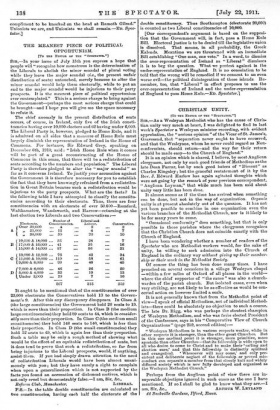LfiltISTIAN UNITY.
[TO THE BDTTOR OF THE " SFECTATOH."1
Sra,—As a Wesleyan Methodist who has the cause of Chris.
tian unity very much at heart, I was delighted to find in last week's Spectator a Wesleyan minister recording, with evident
approbation, the "serious opinion "of the Vicar of St. James's, Gravesend, that "separation never ought to have occurred, and that the Wesleyans, whom he never could regard as Non- conformists, should return—and the way for their return should be made easy—to the Church of England."
It is an opinion which is shared, I believe, by most Anglican clergymen, not only by such good friends of Methodism as the late Dean Farrar, but by such good haters of "Dissent" as Charles Kingsley; but the graceful restatement of it by the Rev. J. Edward Harlow has again agitated thoughts which
were set going by the remark of your previous correspondent, "Anglican Layman," that while much has been said about
unity very little has been done.
It almost seems as if the time has arrived when something can be done, but not in the way of organization. Organic unity is at present absolutely out of the question. It has not
yet been possible to combine in one organization even the various branches of the Methodist Church, nor is it likely to be for many years to come.
"Occasional conformity" does something, but that is only possible in those parishes where the clergyman recognizes that the Christian Church does not coincide exactly with the Church of England.
I have been wondering whether a number of readers of the
Spectator who are Methodist workers would, for the sake of unity, be willing to seek admission into the Church of England in the ordinary way without giving up their member- ship or their work in the Methodist Society.
Of course the thing has been done many times. I have preached on several occasions in a village Wesleyan chapel —within a few miles of Oxford of all places in the world- -where the chief supporter of "the cause " was also a church- warden of the parish church. But isolated cases, even when very striking, are not likely to be as effective as would be con- certed action on however limited a scale.
It is not generally known that from the Methodist point of view—I speak of official Methodism, not of individual Method- ists—there could be absolutely no objection to such a course. The late Dr. Rigg, who was perhaps the stoutest champion
of Wesleyan Methodism, and who was twice elected President of the Conference, says in his "Comparative View of Church Organizations" (page 259, second edition) :— "Wesleyan Methodism is in various respects weaker, while in other respects it is stronger, than the other great Churches. But in this one cardinal point it is stronger, more primitive, more apostolic than other Churches—that its fellowship is wide open to all who desire to come to Christ and to make their calling and election sure,' and that this fellowship is distinctly spiritual and evangelical. Whosoever will may come,' and only per- sistent and deliberate neglect of the fellowship or proved mis- conduct can separate a member from that closely knit and widely diffused society which is now hilly developed and organized as the Wesleyan Methodist Church."
Perhaps from the Anglican point of view there are in- superable objections ignored in such cases as the one I have mentioned. If so I shall be glad to know what they are.—I






































 Previous page
Previous page